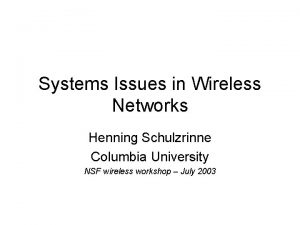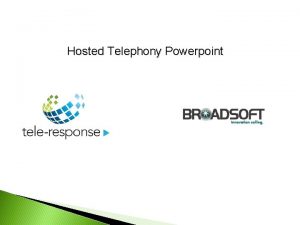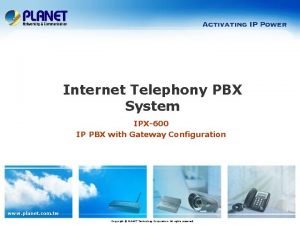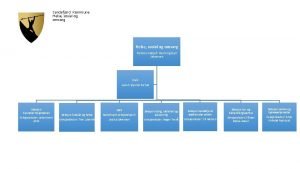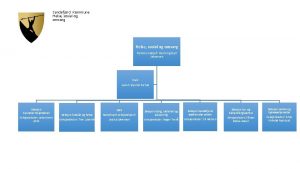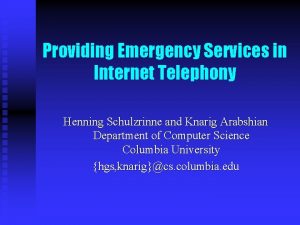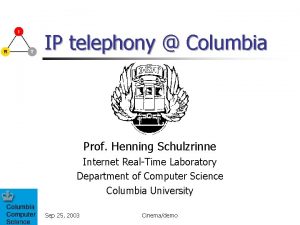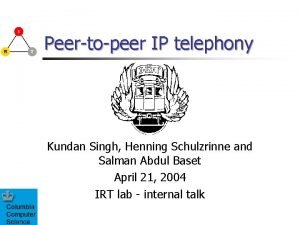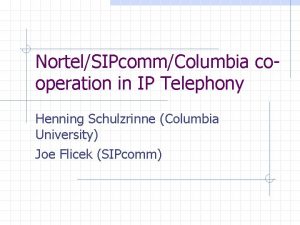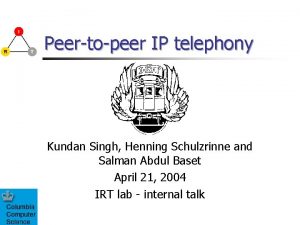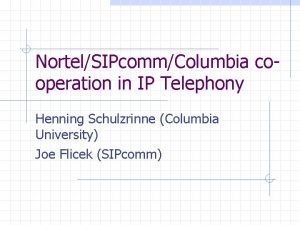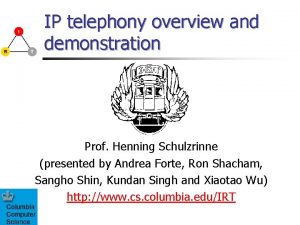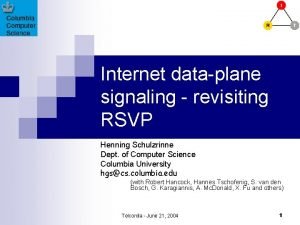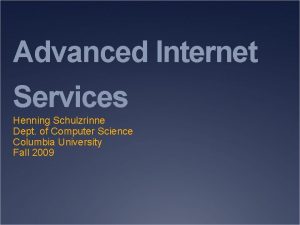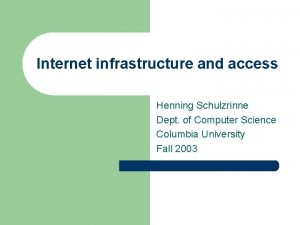Internet Telephony Vo IP Henning Schulzrinne Dept of











- Slides: 11

Internet Telephony (Vo. IP) Henning Schulzrinne Dept. of Computer Science Columbia University Fall 2003

Overview l l l new Internet services: “telephone”, “radio”, “television” why Internet telephony? why not already? Internet telephony modalities components needed: – – – audio coding data transport quality of service – resource reservation signaling PSTN interworking: gateway location, number translation

Name confusion l Commonly used interchangeably: – – – l l Internet telephony Voice-over-IP (Vo. IP) IP telephony (IPtel) Also: Vo. P (any of ATM, IP, MPLS) Some reserve Internet telephony for transmission across the (public) Internet Transmission of telephone services over IP-based packet switched networks Also includes video and other media, not just voice

New Internet services l l tougher: replacing dedicated electronic media vs. new modes (web, email) distribution media (radio, TV): hard to beat one antenna tower for millions of $30 receivers typewriter model of development radio, TV, telephone: a (protocol) convergence?

The phone works – why bother with Vo. IP user perspective carrier perspective variable compression: tin can to broadcast quality no need for dedicated lines better codecs + silence suppression – packet header overhead = maybe reduced bandwidth security through encryption shared facilities simplify management, redundancy caller & talker identification advanced services better user interface (more than 12 keys, visual feedback, semantic rather than stimulus) cheaper bit switching no local access fees (but dropping to 1 c/min for PSTN) fax as data rather than voiceband data (14. 4 kb/s) adding video, application sharing is easy

Emergency Calling l l l 911 in North America, 112 in Europe, others elsewhere First implemented 1968 in US, now roughly 95% of US population Basic 911 service: route emergency call to nearest emergency call center (public safety answering point – PSAP) Later, enhanced 911 (E-9 -1 -1) for selective routing and conveying caller location information to PSAP Roughly, 150 million 911 calls per year (2000) – l 45 million wireless For wireless: Phase I and Phase II – – Phase I conveys call back number + Pseudo-ANI (cell face identifier) to PSAP Phase II provides caller location (e. g. , via GPS or TOA)

Wireless 911 Phase II - TDOA Bell. South

Wireless 911 Phase II - EOTD Bell. South

Wireless 911 Phase II l l l Accuracy 67% 95% Handset-based 50 m 150 m Network-based 100 m 300 m Example: Sprint PCS and Nextel use GPS Implementation just starting Vol. P has similar problems as wireless: – devices change “network attachment point”

E 9 -1 -1 Call flow elements - wireline End office Loop Acces s Contr ol ie DLC Syste m ES Trunks E 9 -1 -1 Tandem w/SRDB Public Safety Answering Point EM Trunks PSAP ALI Data Links The Local Loop ALI SCP GATEWAY (Firewall) Recent Change Links DBMS Update Links Service Providers ALI Database Elements

E 9 -1 -1 CALL FLOW ELEMENTS - WIRELESS PDE 3 4 MPC E 2 TD 2 1 MSC ALI/SR DBASE 8 5 E 9 -1 -1 Tandem w/SRDB L’s 9 6 PSAP Public Safety Answering Point #9 is only applicable in a CAS-Hybrid architecture, such as Bell. South’s WLS 911 Solution 7
